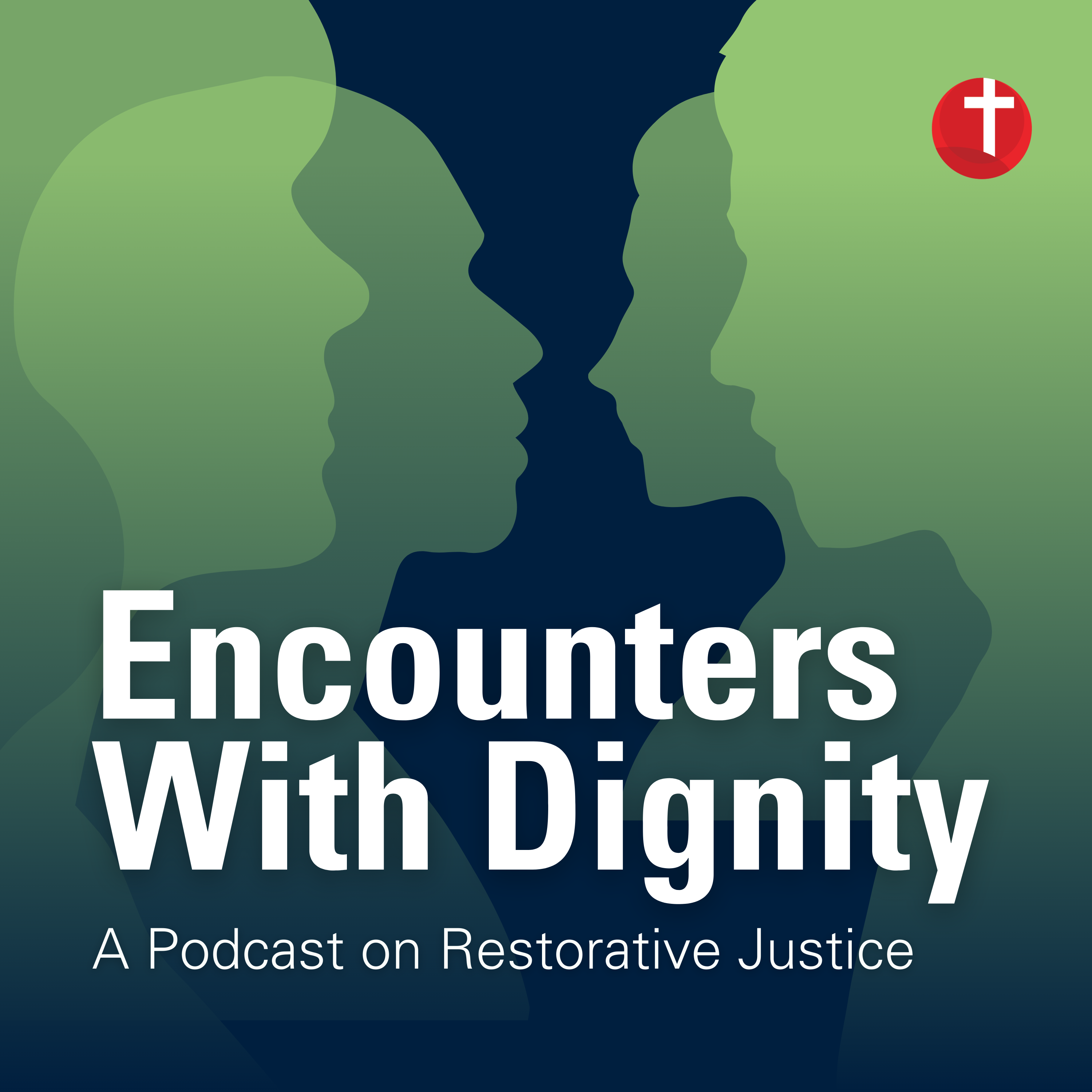Bishop Robert McElroy — Becoming Like the Good Samaritan
It's not hard to see ourselves in the familiar story of the Good Samaritan. At different times in our lives, we've likely identified with each of the parable's characters — the wounded traveler, the robber, the unconcerned passerby, and the Good Samaritan himself.
In this episode, Most Rev. Robert McElroy, Ordinary Bishop of San Diego, challenges us to sink into these ever-shifting identities, and to find within them "a new generosity of heart, rejection of judgmentalism, and thirst for reconciliation within our own lives and that of our society as a whole."
Transcript
Welcome. It’s so good to be with you for this episode of Encounters with Dignity. I’m your host Caitlin Morneau, Director of Restorative Justice at Catholic Mobilizing Network.
On Encounters with Dignity, you get to hear some incredible speakers illuminate how restorative justice principles align with Gospel values. In this episode, Bishop Robert McElroy, Ordinary Bishop of the Catholic Diocese of San Diego, dives into the parable of the Good Samaritan, as examined in Pope Francis’ encyclical, "Fratelli Tutti.” Bishop McElroy shows us how each character in this parable holds lessons as we discern ways to transform the woundedness in our society.
Restorative justice, of course, is one approach. It gives us core principles for binding up individual and societal wounds in a way that upholds human dignity and builds just relationships. It offers us specific practices that seek healing for victims while promoting meaningful accountability for those responsible. It helps us advance racial equity and enable the transformation of wounded people, communities, and systems alike.
At Catholic Mobilizing Network, we recognize that we are not alone in this work. Restorative justice is a growing national movement, utilizing practices that range from peacemaking circles and victim-offender conferencing to truth and reconciliation processes. These practices are taking hold in communities, schools, and institutions -- including the Catholic Church -- and their roots lie deep in a multitude of spiritual and cultural traditions.
Already on Encounters With Dignity, we’ve heard from voices of witness and leadership in the community and legal system. For those of us who are Catholic, Bishop McElroy’s talk invites us to understand the particular ways that the Gospel and our Church’s social tradition can inspire and inform our restorative justice practice.
Bishop Robert McElroy is the President of the California Catholic Conference and serves as a member of the U.S. Conference of Catholic Bishops’ committees on domestic justice and international affairs. He has written two books and a series of articles upon key elements of Catholic social teaching. He is a staunch advocate for the dignity of those impacted by incarceration and is a leading voice for peace and justice nationally.
As always, I invite you to consider a few questions as you listen:
Which of the characters in this parable do you identify with?
How do you aspire to be more like the Good Samaritan?
How do your religious or cultural identities influence your own discernment of restorative justice?
BISHOP MCELROY::The parable of the good Samaritan constitutes the moral centerpiece of the Pope's message. For that reason, Francis examines this parable in depth, calling us to look upon it in holy new ways to understand with ever greater richness, the dimensions of the love of neighbor, which Christ calls us to as the core of the Christian moral life.
The Gospel says, "Just then a lawyer stood up to test Jesus. 'Teacher,' he said, 'what must I do to inherit eternal life?' Jesus said to him, 'What is written in the law? What do you read there?' The man answered, 'You shall love the Lord with all your God, God with all your heart, with all your soul and all your strength and with all your mind, and your neighbor as yourself.' And Jesus said to him, 'You have given the right answer. Do this and you will live.' But wanting to justify himself further, he asked Jesus, 'And who is my neighbor?'
day he took out two [denarii:The priest and the Levite are figures of indifference. They are religious men, individuals of many fine moral qualities. But they encounter the suffering of the beaten man by the side of the road and simply turn away. They have other obligations that outweigh the overwhelming pain of the man who lies along their path. They prefer not to get involved. They do not wish to challenge or change the system. They don't want to enter into the humanity and the woundedness of the man lying by the roadside because that would demand too much of them. They follow the law and that should be sufficient.
The beaten man symbolizes the tremendous suffering rampant in humanity. And in this key moment in his life, he is overcome with aloneness. He sees the priest and the Levite walk by and he endures a new moment of abandonment from the very men who should stand with him, fellow Jews, religious leaders, men of means who could assist him. When he sees the Samaritan coming, he despairs thinking, "What could I claim in justice or in compassion from a man who is my enemy by birth?" Finally, comes the Samaritan, walking intently on the road, eager to arrive in time for his next appointment. Precisely because we have heard this parable so many times we mistakenly think it is easy for the Samaritan to reach out and help. It is not.
The road is a dangerous one and he is alone. He must ponder, "Is this man really the beaten victim of robbers or is he merely a lure to get me to stop so the robbers could victimize me also? Even if the man by the side of the road is not a lure, are the robbers still lurking nearby, seeking other targets?" Our fundamental misunderstanding of the heroism of the good Samaritan is our belief that he was merely compassionate and generous. In fact, the greatness of the good Samaritan was that he was willing to risk everything to help a person that he did not know and had nothing in common with. No obligations.
After sketching out the core identity of each of the characters in the parable, Pope Francis springs his spiritual trap. "If we extend our gaze to the history of our own lives, all of us are or have been like each of the characters in the parable. All of us have in ourselves something of the wounded man, something of the robber, something of the passer-by and something of the good Samaritan." I would ask that we now just take a moment to ponder that reality that the Pope points us to. And to reflect silently for a short period of time on this question, how do we see ourselves being the wounded man, the robber, the passer-by and the good Samaritan at important moments in our past life (silence)?
I propose to you today that these same characters of Jesus' parable, passer-by, robber, victim and good Samaritan also reflect the power and the richness of an ethic of restorative justice. Priest and the Levite are leaders in the social system. They accept the rules and laws of their society because to do so brings peace and order to their worlds. They notice the man beaten by the side of the road. They see his suffering, but feel no obligation to help him because the rules do not require it. There is a sense of procedural justice that is clear but limited in their minds, secure but not expansive. The ethic of restorative justice calls us as passers-by to move beyond this tidy notion of justice, to invest ourselves in a deeper notion of repair and reconciliation, which lies not in mere punishment, or even in rehabilitation, isolated, but in moving our society toward a substantive repair for the crimes and the injuries that we see all around us. So the cycles of anger and shame and retribution might be replaced with a hard won spirit of mutual peace and reconciliation.
This means entering into the woundedness of both the victim by the side of the road and the humanity of the robber. It is far more expansive and demanding a notion of justice than procedural justice can ever hope to be. If we continue upon our journey of contemplating the characters in the parable of the good Samaritan to find true justice, we encounter the victim who has been deeply wounded by crime, lying on the side of the road, seeking to be whole once more. It is precisely in recognizing the many dimensions of the suffering of the man or woman who has been assaulted in body or soul or spirit that we find the only pathway to authentic and comprehensive healing and restoration.
It is critical to recognize that in vindicating the humanity of the offender, we not obscure the harm that he or she has done. For truth is foundational to any restorative justice. As Pope Francis says in Fratelli Tutti, "Truth, in fact, is an inseparable companion of justice and mercy. Yet even as authentic restorative justice calls us to recognize fully and seek healing for the woman or man lying by the side of the road, it calls it a miracle of grace and healing with the very same victim of crime to be a good Samaritan, reaching out heroically in reconciliation and dialogue to the very individual who has hurt them precisely when there is no claim in strict justice to do so. The movement toward personal encounter and dialogue that is so vital to restorative justice, also the capacity to bring about, in many instances, transformative healing and reconciliation with much work and with many tears. And this richer, deeper concept of justice creates the only culture of crime and justice that can bring both the personal and societal levels, peace rather than ever more anger and violence.
The figure of the robber in the good Samaritan is in the shadows throughout the action of the story. But it is to him that restorative justice brings the greatest grace. For a framework of restoration allows the robber to be a good Samaritan also, bringing healing to the very people he or she has injured. Such action does not have precisely the heroism of the good Samaritan, who risks himself for a person to which he has no obligation in justice. But offenders can have, through restorative justice, a heroism nonetheless, bringing a gift to those who they may have hurt that no one else can bring and finding a new dimension of personal peace in the process. The beauty of the ethic of restorative justice is precisely that it breaks through the false order of the justice system as it currently exists in our country, our church and our institutional life.
It calls us to see ourselves in each of the characters of the parable of the good Samaritan and in doing so to find a new generosity of heart, rejection of judgmentalism and thirst for reconciliation within our own lives and that of our society as a whole. I pray that together we might move steadily toward a system of justice and forgiveness and reconciliation where the good Samaritan would truly feel at home.
CAITLIN:One of the things I appreciate about “Fratelli Tutti” and Bishop McElroy’s talk is how they take this Biblical story that we have, perhaps, heard so many times, and broaden what we think we know about it.
And this is just what Jesus does time and time again in the Gospels, too. This parable is just one example of someone demanding a simple up-or-down answer from Jesus that fits neatly within the established structures of the time. Instead, Jesus replies with a challenge to rethink the foundations of the question itself.
This still happens today, of course. The legal constructs of guilt and punishment are so familiar that they penetrate our everyday lives. So many times, we default to adversarial ways of thinking in terms of winners and losers, us vs. them.
Restorative justice, and the Gospel, reminds us that amid deep wounds, our ultimate goal is to be in right relationship with one another - where violence ceases and dignity flourishes. And so, “to heal open wounds,” as Pope Francis says, “there is a need for peacemakers to work boldly and creatively to initiate processes of healing and renewed encounter.”
With this in mind, I’m reminded that restorative justice cannot simply be an “add on” program or project. Nor can it be just a pretty name for activities that perpetuate dehumanizing systems. It is a beckoning to be like the Good Samaritan and embody the kind of accompaniment and encounter that re-stitches the very fabric of community.
To hear more about what restorative justice looks like in practice, join us next month when Danielle Sered, executive director of Common Justice, illustrates how true accountability benefits both those who experience harm and those who cause it, in a way that punishment alone does not.
If you enjoyed this episode of Encounters With Dignity, make sure to subscribe to our show from your favorite podcast platform, or by visiting catholicsmobilizing.org/encounters. For podcast updates and other news from Catholic Mobilizing Network, follow us on social media or sign up for our emails at catholicsmobilizing.org/join.
Feeling ready to engage more deeply with restorative practices? Then check out “Paths of Renewed Encounter,” CMN’s restorative justice engagement guide for Catholic communities. Available at catholicsmobilizing.org/paths.
Will you pray with me…
God our neighbor…
Expand our notions of justice beyond laws and rules toward deeper notions of repair and reconciliation
Move us beyond punishment, and rehabilitation, toward healing and right-relationship.
Move us beyond anger, violence, and retribution, toward wholeness and mutual peace.
Amen


